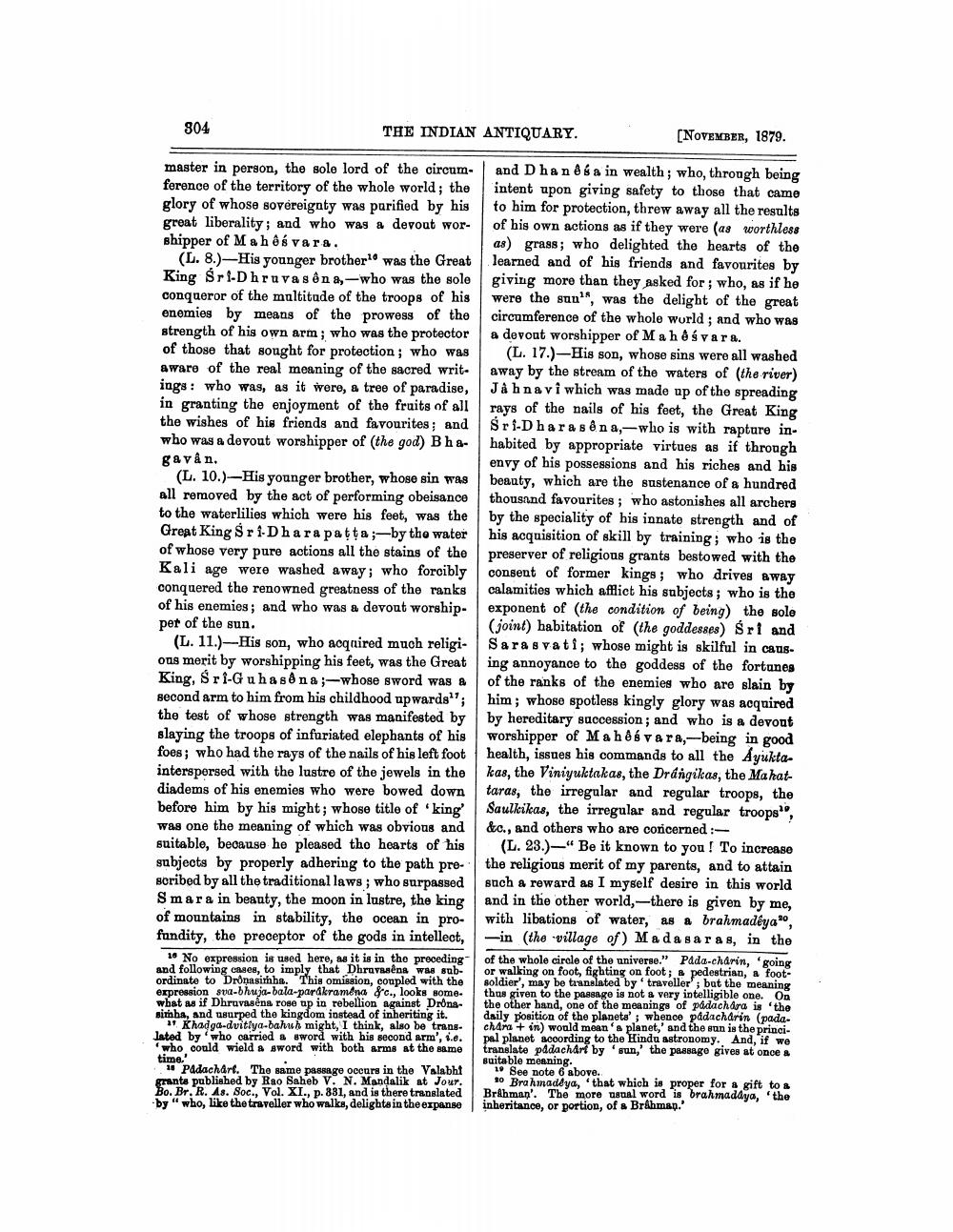________________
804
THE INDIAN ANTIQUARY.
[NOVEMBER, 1879.
master in person, the sole lord of the circum- ference of the territory of the whole world ; the glory of whose sovereignty was purified by his great liberality; and who was a devout worshipper of Mahê śvara.
(L. 8.)-His younger brother was the Great King Sri-Dhruvasên a.-who was the sole conqueror of the multitude of the troops of his enemies by means of the prowess of the strength of his own arm; who was the protector of those that sought for protection; who was aware of the real meaning of the sacred writ. ings: who was, as it were, a tree of paradise, in granting the enjoyment of the fruits of all the wishes of his friends and favourites; and who was a devout worshipper of the god) Bh&- garan,
(L. 10.)--His younger brother, whose sin was all removed by the act of performing obeisance to the waterlilies which were his feet, was the Great King Sr 1-Dhara patta;-by the water of whose very pure actions all the stains of the Kali age were washed away; who forcibly conquered the renowned greatness of the ranks of his enemies; and who was a devout worshipper of the sun.
(L. 11.)-His son, who acquired much religions merit by worshipping his feet, was the Great King, Śrf-G uhasena ;-whose sword was second arm to him from his childhood upwards"; the test of whose strength was manifested by slaying the troops of infuriated elephants of his foes; who had the rays of the nails of his left foot interspersed with the lustre of the jewels in the diadems of his enemies who were bowed down before him by his might; whose title of 'king' was one the meaning of which was obvious and suitable, because he pleased the hearts of his subjects by properly adhering to the path prescribed by all the traditional laws; who surpassed Smara in beauty, the moon in lustre, the king of mountains in stability, the ocean in profundity, the preceptor of the gods in intellect,
1. No expression is used here, as it is in the preceding and following cm, to imply that Dhruvuens was subordinate to Dronasitha. This omission, coupled with the expression sua-bhuja-bala-pardkramena &c., looks_some. what as if Dhruvasens rose up in rebellion against Drônesimha, and usurped the kingdom instead of inheriting it.
15 Khadga-dvitiya-bahuh might, I think, also be translated by 'who carried a sword with his second arm', 1.e. who could wield a sword with both arms at the same time.'
4 Padachart. The game passage occurs in the Valabht grants published by Rao Saheb V. N. Mandalik at Jour. Bo. Br. R. As. Soc., Vol. XI., p.881, and is there translated by " who, like the traveller who walks, delights in the expanse
and Dhanê é a in wealth ; who, through being intent upon giving safety to those that came to him for protection, threw away all the results of his own actions as if they were (as worthless as) grass; who delighted the hearts of the learned and of his friends and favourites by giving more than they asked for, who, as if he were the sun', was the delight of the great circumference of the whole world, and who was a devout worshipper of Mahê śvara.
(L. 17.)--His son, whose sins were all washed away by the stream of the waters of (the river) Jahnavi which was made up of the spreading rays of the nails of his feet, the Great King Sri-Dhara sê nan-who is with rapture inhabited by appropriate virtues as if through envy of his possessions and his riches and his beauty, which are the sustenance of a hundred thousnnd favourites; who astonishes all archers by the speciality of his innate strength and of his acquisition of skill by training; who is the preserver of religions grants bestowed with the consent of former kings; who drives away calamities which afflict his subjects; who is the exponent of the condition of being) the sole
(joint) habitation of (the goddesses) srl and | Sarasvati; whose might is skilful in caus
ing annoyance to the goddess of the fortunes of the ranks of the enemies who are slain by him; whose spotless kingly glory was acquired by hereditary succession; and who is a devout worshipper of Mahê é vara,-being in good health, issues his commands to all the Ayuktakas, the Viniyuktakas, the Drangikas, the Mahattaras, the irregular and regular troops, the Saulkikas, the irregular and regular troops, &c., and others who are concerned :
(L. 23.)-"Be it known to you! To increase the religious merit of my parents, and to attain such a reward as I myself desire in this world and in the other world, there is given by me, with libations of water, as a brahmadêya”,
in the village of Mada saras, in the of the whole circle of the universe." Pada-charin, 'going or walking on foot, fighting on foot; & pedestrian, a footsoldier, may be translated by traveller'; but the meaning thus given to the passage is not a very intelligible one. On the other hand, one of the meanings of pádach dra is 'the daily position of the planets'; whence padacharin (padachan + in) would mean planet,' and the sun is the principal planet according to the Hindu astronomy.. And, if we translato pddachart by 'sun,' the passage gives at once a suitable meaning.
19 See note 6 above.
80 Brahmaddya, that which is proper for a gift to a Brâhman'. The more usual word is brahmaddya, the inheritance, or portion, of Brahmap.'




